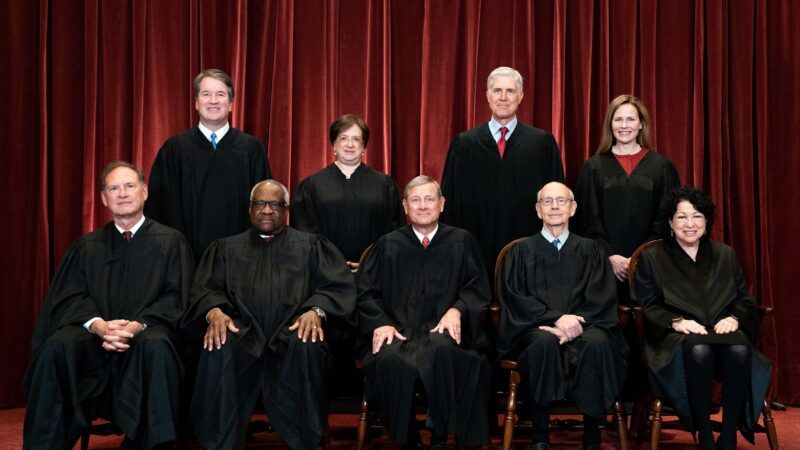(Erin Schaff/POOL via CNP/INSTARimages/Cover Images/Newscom) The U.S. Supreme Court today agreed to hear oral arguments in a major new Sec...
The U.S. Supreme Court today agreed to hear oral arguments in a major new Second Amendment case whose outcome is likely to have significant ramifications for the future of gun control laws around the country.
The case is New York State Rifle & Pistol Association v. Corlett. At issue is the Empire State's requirement that those seeking to obtain a license to carry a concealed handgun in public must first prove to the satisfaction of state officials that they have a "proper cause" to carry a firearm. What counts as a "proper cause"? State law does not precisely define the term, though some judges have. And according to the U.S. Court of Appeals for the 2nd Circuit's 2012 ruling in Kachalsky v. County of Westchester, a "generalized desire to carry a concealed weapon to protect one's person and property does not constitute 'proper cause.'" In other words, if you hope to legally carry a handgun in New York, basic self-defense is not a good enough reason.
The New York State Rifle & Pistol Association, joined by several individual plaintiffs, maintains that this regulatory regime violates the Second Amendment. "A law that flatly prohibits ordinary law-abiding citizens from carrying a handgun for self-defense outside the home cannot be reconciled with the [Supreme] Court's affirmation of the individual right to possess and carry weapons in case of confrontation," they argue in a legal filing submitted to SCOTUS. "The Second Amendment does not exist to protect only the rights of the happy few who distinguish themselves from the body of 'the people' through some 'proper cause.' To the contrary, the Second Amendment exists to protect the rights of all the people."
The Supreme Court has not ruled on the merits of a major Second Amendment case in over a decade. In District of Columbia v. Heller (2008), the Court invalidated Washington, D.C.'s handgun ban for violating the constitutional right to armed self-defense. In McDonald v. Chicago (2010), the Court enforced that right against the states, striking down a similar handgun ban enacted by the Windy City. But because both Heller and McDonald centered on laws banning handgun possession within the home, the Court effectively left unresolved the extent to which the right to keep and bear arms applies in public.
The Supreme Court will soon address that question directly. In its order today, the Court agreed to hear arguments about "whether the State's denial of petitioners' applications for concealed-carry licenses for self-defense violated the Second Amendment."
At least two members of the current Court clearly believe that the Second Amendment's protections should extend beyond the front door. In 2017, Justice Clarence Thomas, joined by Justice Neil Gorsuch, dissented from the Court's refusal to hear a case that asked whether the Constitution protects the right to carry guns in public. "This Court has already suggested that the Second Amendment protects the right to carry firearms in public in some fashion," Thomas wrote. "As we explained in Heller, to 'bear arms' means to 'wear, bear, or carry upon the person or in the clothing or in a pocket, for the purpose of being armed and ready for offensive or defensive action in a case of conflict with another person.' The most natural reading of this definition encompasses public carry. I find it extremely improbable," Thomas added, "that the Framers understood the Second Amendment to protect little more than carrying a gun from the bedroom to the kitchen."
If at least three other justices are willing to join that view in the months ahead, New York State Rifle & Pistol Association v. Corlett could go down in the books alongside Heller and McDonald as another landmark victory for Second Amendment advocates.

No comments